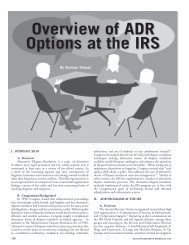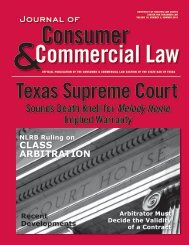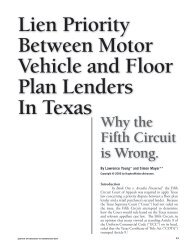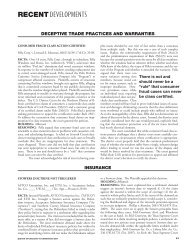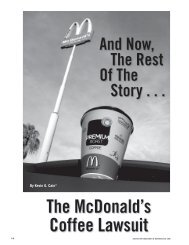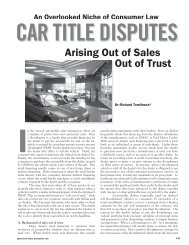Teaching Consumer Credit Law in an Evolving Australian Economy
Teaching Consumer Credit Law in an Evolving Australian Economy
Teaching Consumer Credit Law in an Evolving Australian Economy
Create successful ePaper yourself
Turn your PDF publications into a flip-book with our unique Google optimized e-Paper software.
THE LAST WORD<br />
As Editor of the Journal, I always try to <strong>in</strong>clude a little someth<strong>in</strong>g for everyone. I th<strong>in</strong>k you<br />
will agree that with this issue, I was successful. No matter what your <strong>in</strong>terest is <strong>in</strong> consumer<br />
law, I am pretty confident that this issue has someth<strong>in</strong>g you will enjoy, <strong>an</strong>d f<strong>in</strong>d<br />
<strong>in</strong>formative. The articles deal with topics as diverse as teach<strong>in</strong>g consumer law <strong>in</strong> Australia,<br />
health law privacy, debt collection <strong>an</strong>d DTPA tie-<strong>in</strong> statutes. The News Alert <strong>an</strong>d Recent Development sections<br />
discuss dozens of cases decided dur<strong>in</strong>g the past few months, Theoretical/practical, short/long, reportorial/<strong>an</strong>alytical—whatever<br />
is your cup of tea, you will f<strong>in</strong>d it <strong>in</strong> this issue.<br />
And one comment on recent developments <strong>in</strong> the United States Supreme Court. The last week of the<br />
Supreme Court term was closely watched, as the court issued major op<strong>in</strong>ions deal<strong>in</strong>g with health care <strong>an</strong>d<br />
immigration. But for consumer attorneys, what the Court did not do may have been more signific<strong>an</strong>t. The<br />
court did not issue <strong>an</strong> op<strong>in</strong>ion <strong>in</strong> Edwards v. First Americ<strong>an</strong> Corp., 610 F.3d 514 (9th Cir. 2010), cert gr<strong>an</strong>ted<br />
<strong>in</strong> part, 131 S. Ct. 3022 (2011), <strong>in</strong>stead dismiss<strong>in</strong>g its gr<strong>an</strong>t of certiorari as improvidently gr<strong>an</strong>ted. The<br />
Court’s dismissal is signific<strong>an</strong>t because Edwards raised the question of whether Congress may give consumers<br />
the right to enforce consumer protection statutes without show<strong>in</strong>g actual damages. In Edwards, the N<strong>in</strong>th<br />
Circuit, similar to all other circuits that have considered the issue, held that proof of economic <strong>in</strong>jury was not<br />
required. A contrary rul<strong>in</strong>g by the Supreme Court would have subst<strong>an</strong>tially weakened consumers’ ability to<br />
enforce consumer protection statutes on both <strong>an</strong> <strong>in</strong>dividual <strong>an</strong>d class basis.<br />
Richard M. Alderm<strong>an</strong><br />
Editor-<strong>in</strong>-Chief<br />
56 Journal of <strong>Consumer</strong> & Commercial <strong>Law</strong>



